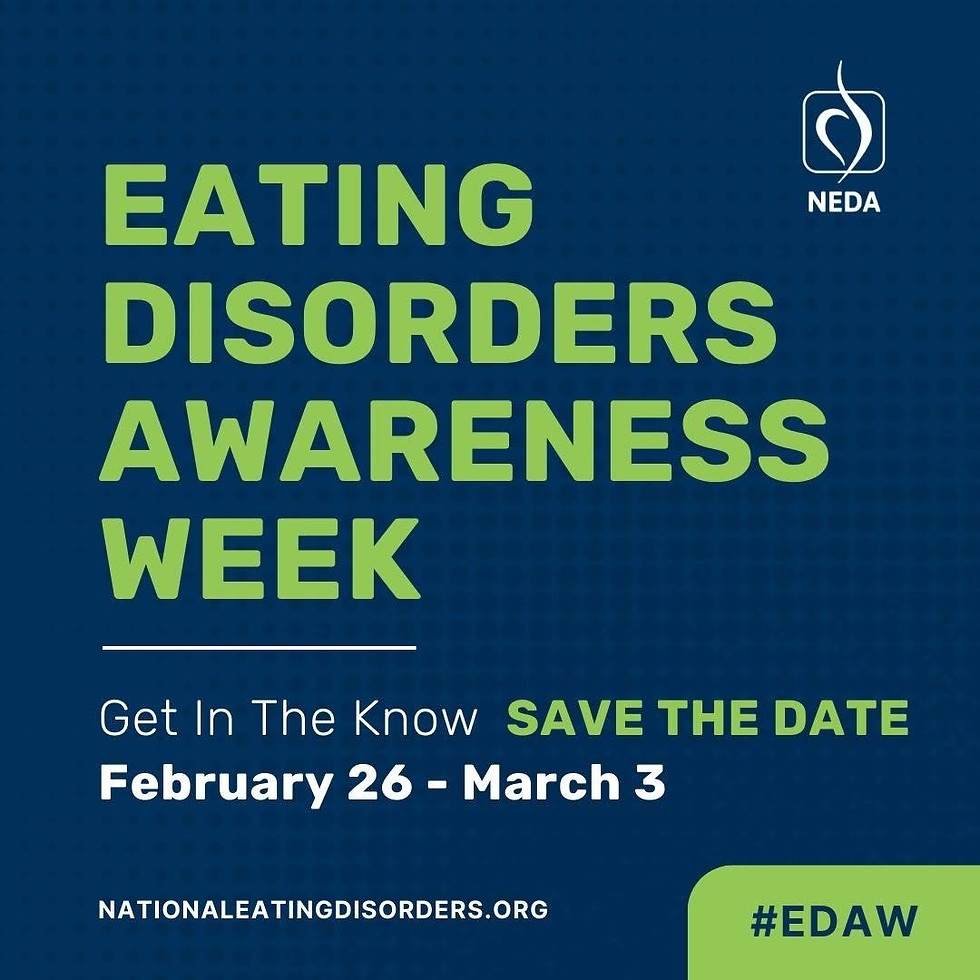Understanding PCOS and Eating Disorders: An Essential Guide
- Renuka Barlingay
- Oct 28, 2023
- 4 min read
Updated: Nov 27, 2023

Polycystic Ovarian Syndrome (PCOS) is a medical condition that affects millions of women worldwide. Eating disorders and how we exercise can mess with our body's hormone levels. It's not a surprise that PCOS, which is related to hormone issues, often happens alongside eating disorders.
This article aims to shed light on this critical link and its impact on women's health, while also offering strategies for navigation.
What is PCOS?
Did you know? PCOS is the most common hormonal disorder in women. The World Health Organization (WHO) estimates that 8–13% of women of reproductive age are affected by PCOS, with a staggering 70% of cases remaining undiagnosed.
Common Symptoms of PCOS include:
- Irregular or missed periods
- Acne & oily skin
- Weight gain
- unexpected hair growth
- Fertility issues
- Male Pattern baldness/ hair thinning
What is the relationship between PCOS and Eating?
Studies show that women who have PCOS are way more likely to have eating problems compared to women who don't have PCOS. They are four times more likely to struggle with eating issues. They also tend to binge eat more often and get into episodes of compulsive exercise.
There are two explanations for the PCOS-ED link. On one hand, if someone eats too much or too little, it can create a hormonal imbalance, leading to conditions like PCOS. On the other hand, having PCOS can make women feel bad about their body shape and weight. PCOS can often lead to weight gain, and hence doctors often tell women with PCOS to diet. As a result, focusing so much on weight control can lead to eating disorders.
To summarise, disordered eating affects hormones, which can lead to PCOS, and having PCOS can lead to even more concerns about weight and shape, making the risk of developing an eating disorder even higher.
Citation: Muhlheim, L. (2020). Eating disorders and women with PCOS. Very Well Mind. Retrieved from https://www.verywellmind.com/eating-disorders-and-pcos-4685798.
Insights from Research
Multiple studies have researched the complex interplay between PCOS and eating behaviors. Some of the key findings include:
PCOS symptoms like insulin changes and food cravings can lead to increased hunger, strong impulses, and unhappiness with one's body.
Binge eating can worsen PCOS symptoms, aiding in weight gain and hormonal imbalances.
Drawing from a comprehensive review of 21 studies, it's evident that:
A significant portion of women with PCOS struggle with binge eating.
Women diagnosed with eating disorders, particularly Bulimia and Binge Eating Disorder, are more likely to have polycystic ovaries
Citation: Chiara Paganini, Gregory Peterson, Vasilis Stavropoulos IKJ. The overlap between binge eating behaviors and polycystic ovarian syndrome: An etiological integrative Model. Curr Pharm Des 2018;24:999-1006.
Delving into the Indian context reveals more layers to this issue.
Did you know women's self-esteem is closely tied to their body image? This bond intensifies when PCOS leads to physical changes or disfigurement. Moreover, PCOS often affects women's feminine identity and results in psychological distress.
Therefore, when creating body-positive interventions, we should focus on sociocultural factors, gender influences, weight & perception aspects.
Citation: Kriti, V., Kumari, S., & Joshi, S. (2022). Body image and self-esteem in girls with polycystic ovary syndrome (PCOS): The Indian scenario. Mind and Society, 11(01), 82–88. https://doi.org/10.56011/mind-mri-111-202211
Notably, this affects not only adult women but also adolescents. A 2015 study revealed that 16% of adolescents with menstrual issues had PCOS, and 3% had battled anorexia or bulimia.
Citation: Balaji S, Amadi C, Prasad S, Bala Kasav J, Upadhyay V, Singh AK, et al. Urban rural comparisons of polycystic ovary syndrome burden among adolescent girls in a hospital setting in India. Biomed Res Int 2015;2015:158951.
What role can culture and society play in the PCOS-ED link in India?
In India, as in many societies, there are pressures on women to maintain a specific beauty standard. Women with PCOS often experience symptoms like hirsutism, weight gain, and acne, which can deviate from the cultural ideals of beauty. This can lead to body image issues and possibly contribute to the development of ED.
Societal pressures to conform to certain body types can lead to distressing eating patterns and an attempt to control weight in ways that align with societal expectations, which can lead to ED behaviors.
There is a significant stigma attached to both PCOS and ED in many Indian communities, partly due to a lack of awareness and understanding. This stigma can lead to shame and secrecy, preventing those affected from seeking help.
Societal expectations for women to marry and bear children can be distressing for those with PCOS, who may face fertility issues, further contributing to the stress and potentially leading to ED as a coping mechanism.
Access to healthcare in India can be limited, and there is often a lack of specialized care for conditions like PCOS and ED, particularly in rural areas. This can delay diagnosis and treatment, worsening outcomes.
Strategies for addressing EDs in women with PCOS
Regular check-ins & early ED detection.
Collaborative care between Doctors, therapists, and dietitians.
Spread awareness about the ED-PCOS link.
Continuous research to refine our interventions
Regular evaluation of Medication & diet
Support & share – Encouraging open conversations!
In conclusion, understanding this complex relationship between eating and PCOS is essential. Together through knowledge and support, let us promote holistic well-being for all women!





Comments